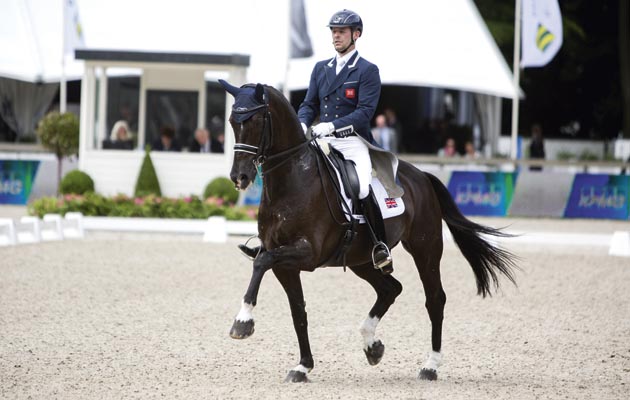At the grand prix in Rotterdam last week (18 June, see p64), British team member Spencer Wilton received scores varying from 65% to 73% for his test aboard Numberto.
The president of the ground jury, France’s Jean-Michel Roudier, had him in fifth, while the judge at H, Belgium’s Jacques van Daele, thought his performance worthy of only 25th place.
Spencer told H&H: “Until last week I had never really entered the debate on judging as I appreciate how difficult the job is and accept that there is always going to be some disagreement. However, when you have two marks that are totally different, from judges that are sitting 10 paces away from one another, it’s not right. It’s as if I had ridden two completely different tests.”
Such discrepancies are not unusual. At the 2013 European Championships in Herning, one judge marked Michael Eilberg and Half Moon Delphi (who has recently been sold), 6% lower than the others — a disparity that potentially cost Britain the gold medal.
Pressure on the FEI to re-evaluate the judging system is mounting. A recent online survey carried out by the International Dressage Riders Club (IRDC) revealed that an overwhelming majority of dressage fans said judging was their biggest bugbear. More than half (58%) of the 3,254 respondents who had watched dressage live considered subjectivity in judging the most significant issue, followed by lack of transparency in judging (50%) and difficulty in understanding judging (30%).
Kyra Kyrklund, president of the IDRC, said: “Developing a system that is accurate, transparent and easy to understand for everyone interested in the sport has become one of the most important issues for the future of dressage.”
Time for a revamp
The IDRC believes the solution is an evaluation matrix based on a code of points, similar to that used in other artistic sports like gymnastics and figure skating. The judging system for these sports was completely — and successfully — revamped around 15 years ago.
Wayne Channon, secretary of the IDRC, told H&H: “The code of points is a totally new system that will shift the emphasis from qualitative to quantitative marking.”
The matrix will give a value for any deviation from perfection, theoretically making it easier for judges to quantify mistakes.
“If a horse is behind the vertical, it will automatically have a certain number of points deducted,” explained Wayne. “The same goes for the shoulder-in, which should be ridden on three tracks; if there is any deviation on to two or four tracks, the judge will know to deduct X or Y.”
An iPad loaded with the code of points scoring app will replace the traditional paper test-sheet and pen.
Wayne believes that the new system could yield other significant benefits.
“It is time that we move to displaying marks by judge in real-time at all major shows, and having a code of points will facilitate this,” he said. “It will also be possible to give riders better feedback as everything will be recorded electronically.”
International dressage rider and judge Dane Rawlins is in favour of the proposal.
“What is currently lacking is a clear basis by which judges can form an opinion,” he said.
“I have attended judges’ conventions in the past, where one person has disagreed over the allocation of a mark. It is all very well saying, ‘I thought it was only worth a 6.5’, but the rider will want to know exactly why. A code of points would take away this subjectivity.”
Olympic rider Richard Davison agrees that it is time for the sport to adopt a standardised evaluation system.
“If we want dressage to globalise, we need a global system,” he told H&H.
“Judges do the best they can while working within a relatively loose framework and are challenged with weighting multiple factors in one mark.
“With more FEI judges from a greater number of countries, the weaknesses in the current system are becoming ever more apparent. I like the fact that the code of points system allows the judge to start with a 10 and deduct points according to faults.”
Riders agree that change is needed, but are divided over whether a codification system is the best way forward.
Fiona Bigwood told H&H: “I think the concept is a good one. It’s wrong that one judge puts a horse fifth and another other has it 25th. It’s not good for spectators and it does the image of the sport no favours.”
Others are more sceptical.
Carl Hester has previously written in H&H: “Of course there are discrepancies at times, but I have yet to be convinced that this is a route we should go down. The final result should be that the best horse wins, not which judge gave what.”
In place for Tokyo 2020?
The next step is to produce a basic document which experienced, top-level judges can evaluate, make suggestions and refine.
Wayne said: “We have had an offer from a European country [which Wayne declined to name] to run a practice competition at grand prix level using the new scoring system.”
British Dressage told H&H that it would consider the IDRC’s proposal.
Judges’ director Linda Whetstone said: “Judging is of critical importance to the sport and there is always room for improvement. We will evaluate the suggested scoring system as soon as the details are available.”
The FEI has issued a similar response.
“We will review the proposal once it has been submitted,” a spokesman told H&H.
Should it get a green light, the next major step will be to educate judges.
“One of the key points is that it lends itself to online education,” said Wayne. “This will allow a trainee judge to practise at home and receive immediate feedback.Theoretically, this should enable judges to progress more rapidly through the levels.”
Although this is by no means a done deal, the IDRC is hopeful that a new
system will be in place by the Tokyo Olympics in 2020.
Ref: H&H 25 June, 2015

